

Inégalités mondiales : les absurdes statistiques d’Oxfam. "Les 1% les plus riches vont bientôt détenir 50% de la richesse mondiale, soit plus que les 99% restant", "85 personnes détiennent autant que 3.5 milliards d'autres" voilà quelques uns des titres que vous avez pu lire hier suite à la publication d'un nouveau rapport de l'ONG Oxfam sur les inégalités mondiales.

Le tout illustré d'infographies, ou de photos de bon goût mettant en abîme des Africains aux yeux couverts de mouches et des ploutocrates allumant leur gros cigare avec des billets de 100 dollars dans une Lamborghini plaquée or. Les inégalités sont un sujet important, ce qui est une raison de les traiter sur la base de faits. Erreur fondamentale d'attribution. Un article de Wikipédia, l'encyclopédie libre.

L'erreur fondamentale d'attribution consiste à sous-estimer les causes situationnelles au profit des causes dispositionnelles. En 1967, Jones et Harris font écouter à des sujets des discours pro-Castro et anti-Castro. How Technology Could Help Fight Income Inequality. Photo Economic View By TYLER COWEN Rising income inequality has set off fierce political and economic debates, but one important angle hasn’t been explored adequately.
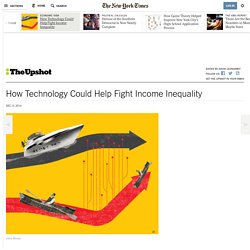
We need to ask whether market forces themselves might limit or reverse the trend. Why the Housing Bubble Tanked the Economy And the Tech Bubble Didn’t. In 2000, the dot-com bubble burst, destroying $6.2 trillion in household wealth over the next two years.
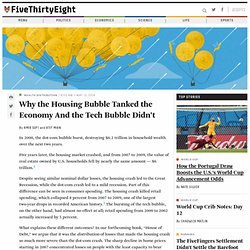
Five years later, the housing market crashed, and from 2007 to 2009, the value of real estate owned by U.S. households fell by nearly the same amount — $6 trillion. Despite seeing similar nominal dollar losses, the housing crash led to the Great Recession, while the dot-com crash led to a mild recession. Part of this difference can be seen in consumer spending. The housing crash killed retail spending, which collapsed 8 percent from 2007 to 2009, one of the largest two-year drops in recorded American history. The bursting of the tech bubble, on the other hand, had almost no effect at all; retail spending from 2000 to 2002 actually increased by 5 percent. This is Paul Krugman's chart of the year, and it's easy to see why.
Paul Krugman calls this, from the City University of New York Grad Center's Branko Milanovic, his chart of the year: If you follow economic news, the chart shouldn't be all that surprising.
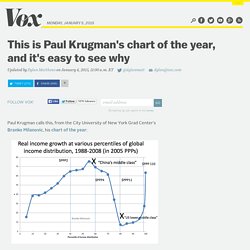
French economists: Toulouse v Paris. IF PHILOSOPHERS in France are national treasures, economists are dreary specimens.
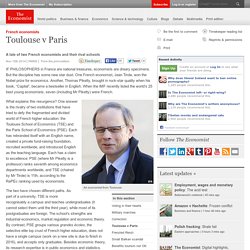
But the discipline has some new star dust. Global income inequality is falling. The Accidental Theorist. Imagine an economy that produces only two things: hot dogs and buns.
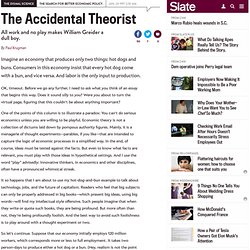
Consumers in this economy insist that every hot dog come with a bun, and vice versa. And labor is the only input to production. ReMa Groningen.
How big a deal is replication failure? THE WORLD QUESTION CENTER 2006 — Page 17. NASSIM TALEB Epistemologist of Randomness and Applied Statistician; Author, The Black Swan The Irrelevance of "Probability" I spent a long time believing in the centrality of probability in life and advocating that we should express everything in terms of degrees of credence, with unitary probabilities as a special case for total certainties, and null for total implausibility.
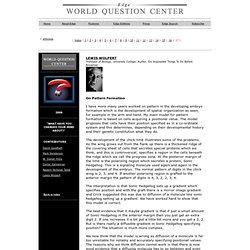
Critical thinking, knowledge, beliefs, everything needed to be probabilized. Until I came to realize, twelve years ago, that I was wrong in this notion that the calculus of probability could be a guide to life and help society. Qui paie les impôts? L'incidence fiscale (= qui paie réellement les impôts) figure en bonne place sur le podium des concepts économiques les moins bien compris par les hommes politiques, les journalistes, les juristes, voire par certains économistes plus ou moins autoproclamés.
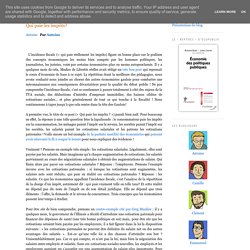
Il y a quelques mois de cela, Markss de Libertés réelles avait rédigé un très bon post qui reprenait le cours d’économie de base à ce sujet. La répétition étant la meilleure des pédagogies, nous avons souhaité nous joindre au choeur des autres économistes gaulois pour combattre une méconnaissance aux conséquences dévastatrices pour la qualité du débat public ! La compétitivité est aussi un business ! Cela ne se discute pas: la France ne tient pas le rythme international en matière de productivité internationale et son industrie s’étiole.
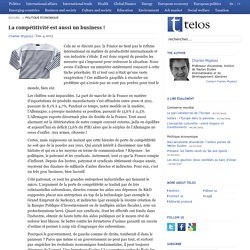
Money Chart. Jerven on Measuring African Poverty and Progress. Les citrons d’Akerlof, ou comment raisonnent les économistes. Depuis 2008, l’économie a fait l’objet d’attaques particulièrement graves, avec notamment une sévère mise en question de son caractère scientifique. La science économique sous le feu des critiques Certaines de ces attaques ne sont pas nouvelles. Par exemple, les penseurs post-modernes ont pointé depuis plusieurs décennies l’arrière-plan idéologique de la discipline, trop souvent minimisé ou ignoré par ceux qui la pratiquent.
Aucune science ne peut prétendre à une parfaite objectivité et surtout pas les sciences sociales. How Did Economists Get It So Wrong? La désindustrialisation de la France. Timothy Geithner: The Vox interview. How politics makes us stupid. In April and May of 2013, Yale Law professor Dan Kahan — working with coauthors Ellen Peters, Erica Cantrell Dawson, and Paul Slovic — set out to test a question that continuously puzzles scientists: why isn’t good evidence more effective in resolving political debates? For instance, why doesn’t the mounting proof that climate change is a real threat persuade more skeptics? The leading theory, Kahan and his coauthors wrote, is the Science Comprehension Thesis, which says the problem is that the public doesn’t know enough about science to judge the debate. It’s a version of the More Information Hypothesis: a smarter, better educated citizenry wouldn’t have all these problems reading the science and accepting its clear conclusion on climate change.
But Kahan and his team had an alternative hypothesis. Does He Pass the Test? by Paul Krugman. Stress Test: Reflections on Financial Crises by Timothy F. Geithner Crown, 580 pp., $35.00 Midway through Timothy Geithner’s Stress Test, the former treasury secretary describes a late-2008 conversation with the then president-elect. Nobel Prize 2014: Jean Tirole. A Nobel Prize for applied theory – now this something I can get behind! Jean Tirole’s prize announcement credits him for his work on market power and regulation, and there is no question that he is among the leaders, if not the world leader, in the application of mechanism design theory to industrial organization; indeed, the idea of doing IO in the absence of this theoretical toolbox seems so strange to me that it’s hard to imagine anyone had ever done it! Economics is sometimes defined by a core principle that agents – people or firms – respond to incentives. 26 charts and maps that show the world is getting much, much better.
By Dylan Matthews on March 20, 2015 Economic progress Extreme poverty has fallenThis is probably the most important chart on this list. The extraordinary rate of economic growth in India and China — as well as slower but still significant growth in other developing countries — has led to a huge decline in the share of the world population living on less than $1.25 a day, from 53 percent in 1981 to 17 percent in 2011. That's a low bar for what counts as poverty, and some development experts are arguing we should be using a global poverty line of $10-15 a day instead, but that very debate is a sign of the tremendous progress made in recent decades.